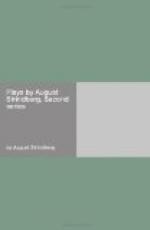Among more than half a hundred plays produced by Strindberg during his lifetime, none has won such widespread attention as “Miss Julia,” both on account of its masterful construction and its gripping theme. Whether liking or disliking it, critics have repeatedly compared it with Ibsen’s “Ghosts,” and not always to the advantage of the latter work. It represents, first of all, its author’s most determined and most daring endeavour to win the modern stage for Naturalism. If he failed in this effort, it must be recalled to his honour that he was among the first to proclaim his own failure and to advocate the seeking of new paths. When the work was still hot from his hands, however, he believed in it with all the fervour of which his spirit was capable, and to bring home its lesson the more forcibly, he added a preface, a sort of dramatic creed, explaining just what he had tried to do, and why. This preface, which has become hardly less famous than the play itself, is here, as I believe, for the first time rendered into English. The acuteness and exhaustiveness of its analysis serves not only to make it a psychological document of rare value, but also to save me much of the comment which without it might be deemed needful.
Years later, while engaged in conducting a theatre for the exclusive performance of his own plays at Stockholm, Strindberg formulated a new dramatic creed—that of his mystical period, in which he was wont to sign himself “the author of ‘Gustavus Vasa,’ ’The Dream Play,’ ‘The Last Knight,’ etc.” It took the form of a pamphlet entitled “A Memorandum to the Members of the Intimate Theatre from the Stage Director” (Stockholm, 1908). There he gave the following data concerning “Miss Julia,” and the movement which that play helped to start:
“In the ’80’s the new time began to extend its demands for reform to the stage also. Zola declared war against the French comedy, with its Brussels carpets, its patent-leather shoes and patent-leather themes, and its dialogue reminding one of the questions and answers of the Catechism. In 1887 Antoine opened his Theatre Libre at Paris, and ‘Therese Raquin,’ although nothing but an adapted novel, became the dominant model. It was the powerful theme and the concentrated form that showed innovation, although the unity of time was not yet observed, and curtain falls were retained. It was then I wrote my dramas: ‘Miss Julia,’ ’The Father,’ and ‘Creditors.’
“‘Miss Julia,’ which was equipped with a now well-known preface, was staged by Antoine, but not until 1892 or 1893, having previously been played by the Students’ Association of the Copenhagen University in 1888 or 1889. In the spring of 1893 ‘Creditors’ was put on at the Theatre L’OEuvre, in Paris, and in the fall of the same year ‘The Father’ was given at the same theatre, with Philippe Garnier in the title part.
“But as early as 1889 the Freie Buehne had been started at Berlin, and before 1893 all three of my dramas had been performed. ’Miss Julia’ was preceded by a lecture given by Paul Schlenther, now director of the Hofburg Theater at Vienna. The principal parts were played by Rosa Bertens, Emanuel Reicher, Rittner and Jarno. And Sigismund Lautenburg, director of the Residenz Theater, gave more than one hundred performances of ‘Creditors.’




